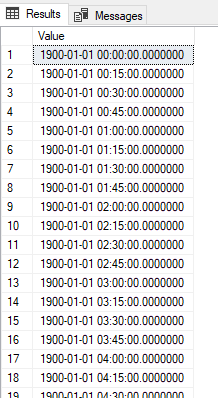Time Tally Table
-
I'm attempting to create a time tally table but it is not working as expected. I just need a start time and end time for a 24 hour period similar to this example. I need each 15 minute increment for each 15 minute start time in a day. As you can see the first record is for 1/1/1900 00:00:000 with an end time of the same. The last record in the table should be 1/1/1900 11:45:000 for the start time and the end time would be the same. Hopefully that makes sense.

Here is my stored procedure
ALTER PROCEDURE [dbo].[PopulateScheduleTallyTable]
-- Add the parameters for the stored procedure here
@start DATETIME = '1/1/1900 00:00:000',
@end DATETIME = '1/1/1900 23:59:000',
@enddate DATETIME = '1/1/1900'
AS
BEGIN
SET NOCOUNT ON;
CREATE TABLE #Table1 (StartTime DATETIME, EndTime DATETIME);
WHILE @start < @end
BEGIN
WHILE @enddate BETWEEN @start AND @end
BEGIN
INSERT INTO #Table1
VALUES (@start, @enddate)
SET @enddate = DATEADD(MINUTE, 15, @enddate)
END
SET @enddate = '1/1/1900 00:00:000'
SET @start = DATEADD(MINUTE, 15, @start)
END
SELECT * FROM #Table1
ENDThis works for the first start time but the inner loop does not run after the first iteration. I'm sure it is something simple that I'm missing but any assistance would be appreciated.
-
A WHILE loop is a really slow way of generating this. Instead, consider using something like this, which does it fast! (Once again, thanks to Jeff Moden for the base code.)
DECLARE @StartDate DATETIME --Inclusive
,@EndDate DATETIME --Exclusive
,@Repeats INT;
SELECT @StartDate = '19000101' --Inclusive
,@EndDate = '19000102' --Exclusive
,@Repeats = DATEDIFF (MINUTE, @StartDate, @EndDate) / 15;
SELECT TOP(@Repeats)
TheMonth = DATEADD (MINUTE, 15 * (ROW_NUMBER () OVER (ORDER BY(SELECT NULL)) - 1), @StartDate)
FROM sys.all_columns ac1
CROSS JOIN sys.all_columns ac2; -
November 14, 2023 at 11:22 pm
Try installing the table valued function here: https://www.sqlservercentral.com/scripts/a-daterange-table-valued-function
Then to select 15 minute intervals as in your example:
SELECT Value
FROM dbo.DateRange('1900-01-01 00:00', '1900-01-01 23:59' ,'mi', 15)
;
-
November 14, 2023 at 11:23 pm
.
- This reply was modified 2 years, 3 months ago by Jonathan AC Roberts. Reason: duplicate
-
November 15, 2023 at 7:22 am
You're working too hard. You can do decimal math on datetime values; 1.0 = one full day, 0.5 = 12 hours, etc:
SELECT getdate() AS [Now], getdate() + 1 AS [aDayFromNow], getdate() + 0.25 AS [6HoursFromNow]
That makes this stuff much easier:
DECLARE @StartTime smalldatetime = 0,
@interval decimal(12, 8) = 15.0 / 1440.0; -- 15 minutes / total minutes in 1 day;
SELECT TOP 96 @StartTime + (ROW_NUMBER() OVER (ORDER BY (SELECT 0)) - 1) * @interval AS [StartTime],
@StartTime + (ROW_NUMBER() OVER (ORDER BY (SELECT 0)) * @interval) AS [EndTime]
FROM sys.all_objects;
StartTime EndTime
----------------------- -----------------------
1900-01-01 00:00:00 1900-01-01 00:15:00
1900-01-01 00:15:00 1900-01-01 00:30:00
1900-01-01 00:30:00 1900-01-01 00:45:00
1900-01-01 00:45:00 1900-01-01 01:00:00
1900-01-01 01:00:00 1900-01-01 01:15:00
1900-01-01 01:15:00 1900-01-01 01:30:00
[...]
1900-01-01 23:30:00 1900-01-01 23:45:00
1900-01-01 23:45:00 1900-01-02 00:00:00
(96 rows affected)Eddie Wuerch
MCM: SQL -
November 16, 2023 at 12:12 am
Jonathan AC Roberts wrote:Try installing the table valued function here: https://www.sqlservercentral.com/scripts/a-daterange-table-valued-function
Then to select 15 minute intervals as in your example:
SELECT Value
FROM dbo.DateRange('1900-01-01 00:00', '1900-01-01 23:59' ,'mi', 15)
;
Chicken dinner right there!
--Jeff Moden
RBAR is pronounced "ree-bar" and is a "Modenism" for Row-By-Agonizing-Row.
First step towards the paradigm shift of writing Set Based code:
________Stop thinking about what you want to do to a ROW... think, instead, of what you want to do to a COLUMN.Change is inevitable... Change for the better is not.
Helpful Links:
How to post code problems
How to Post Performance Problems
Create a Tally Function (fnTally)
Viewing 6 posts - 1 through 6 (of 6 total)
You must be logged in to reply to this topic. Login to reply

